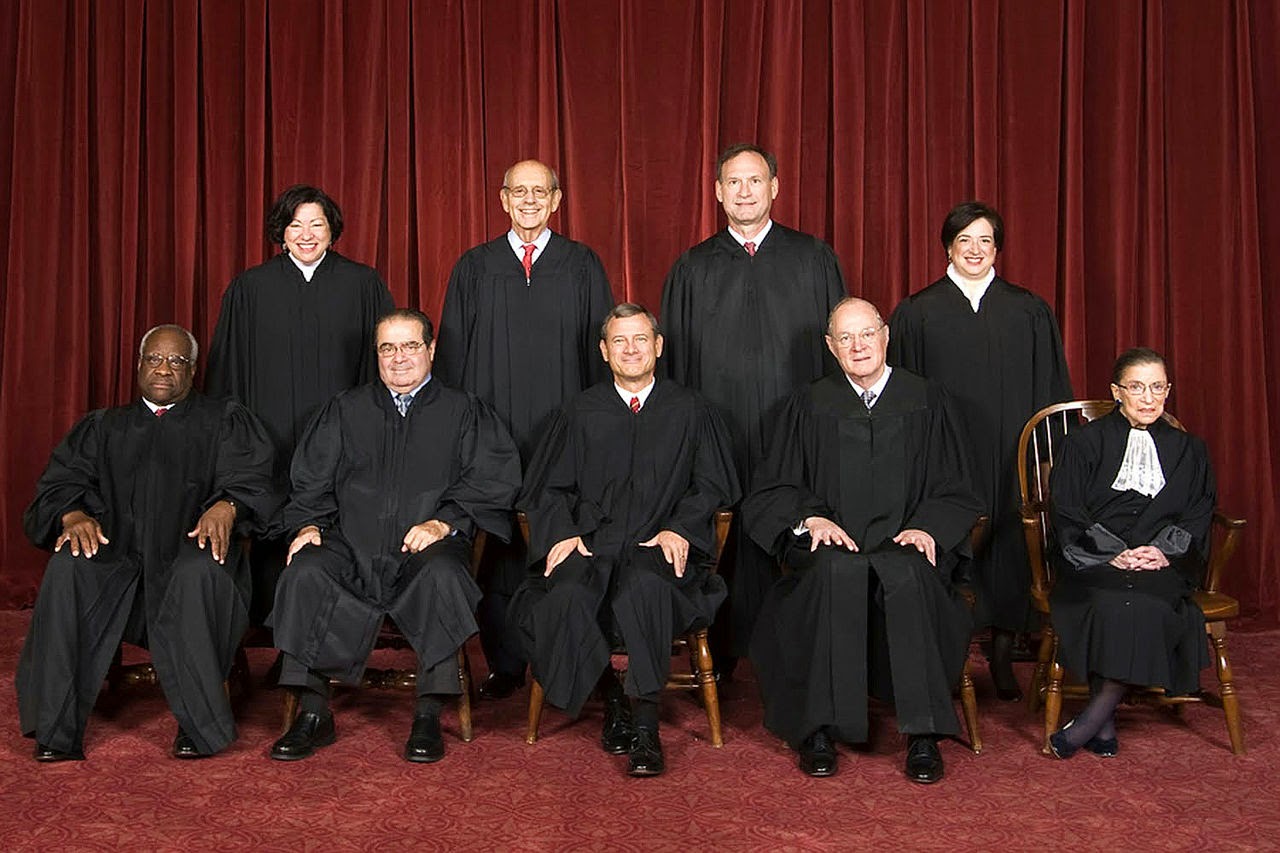Hobby Lobby, Mother Jones, and Justice Ginsburg
 Mother Jones today posted
an article with what it calls “The 8 Best Lines From Ginsburg’s Dissent on theHobby Lobby Contraception Decision.” Here they are, with a few of my own quick observations.
Mother Jones today posted
an article with what it calls “The 8 Best Lines From Ginsburg’s Dissent on theHobby Lobby Contraception Decision.” Here they are, with a few of my own quick observations.
1. “‘In a
decision of startling breadth’ [the decision] would allow corporations to opt
out of almost any law that they find ‘incompatible with their sincerely held
religious beliefs.’”
See my response to number
six below.
2. “The
exemption sought by Hobby Lobby and Conestoga would…deny legions of women who
do not hold their employers' beliefs access to contraceptive coverage.”
To be clear, Hobby Lobby
provides coverage for more than twenty different kinds of contraception. The company’s
objection to the Affordable Care Act’s (aka
Obamacare) mandate focuses on four kinds of “contraceptives” that are not contraceptives
at all, but abortifacients that prevent the implantation of a fertilized egg, thus resulting in the death
of the newly conceived child. All of Hobby Lobby’s female employees will continue
to be covered for the other forms of birth control.[1]
3. “Religious organizations exist to foster the interests of persons
subscribing to the same religious faith. Not so of for-profit corporations.
Workers who sustain the operations of those corporations commonly are not drawn
from one religious community."
These statements are irrelevant.
To my knowledge no one is making the claim that Hobby Lobby is a religious
organization rather than a for-profit corporation. The point at issue is this: May the federal government force the owners of
a privately owned business to act contrary to their religious convictions?
4. “Any decision to use contraceptives made by a woman covered under
Hobby Lobby's or Conestoga's plan will not be propelled by the Government, it
will be the woman's autonomous choice, informed by the physician she consults.”
There’s that slippery word “contraceptives”
again. Let us not forget that the issue in the case is drugs or devices that
act as abortifacients. But even if we modify the statement accordingly, the
point is technically true. The decision a woman makes will not be “propelled”
by the government. Nevertheless, the government will be forcing the owners of a
company to act contrary to their religious convictions by paying for them.
5. “It bears note in this regard that the cost of an IUD is nearly
equivalent to a month's full-time pay for workers earning the minimum wage.”
This also is irrelevant.
6. “Would the exemption…extend to employers with religiously grounded
objections to blood transfusions (Jehovah's Witnesses); antidepressants
(Scientologists); medications derived from pigs, including anesthesia,
intravenous fluids, and pills coated with gelatin (certain Muslims, Jews, and
Hindus); and vaccinations[?]…Not much help there for the lower courts bound by
today's decision.”
The decision undoubtedly
raises a lot of questions about how its principles apply to other religious
objections to the ACA, but this only highlights the problems of government-mandated
healthcare. If we didn’t want to deal with all these tough questions, we shouldn’t
have ventured down this path in the first place. It seems to me that we have three
options. First, we can enforce a one-size-fits-all national healthcare plan
with no exceptions (not even for unions or other Obama supporters) and simply
say, “To hell with your religious concerns.” Second, we can examine each
religiously based objection case by case. Or we can go to a free-market approach
to healthcare, which is hands down the best solution.[2]
7. “Approving some religious claims while deeming others unworthy of
accommodation could be 'perceived as favoring one religion over another,' the
very 'risk the [Constitution's] Establishment Clause was designed to preclude.”
This actually was not what
the Establishment Clause was designed to preclude. It was designed to preclude
a federally funded church.[3]
8. “The court, I fear, has ventured into a minefield.”
No, actually it was a
highly partisan President and Congress who led us here. The court has simply
made a modest attempt to limit some of the damage.
[1]
Perhaps Ginsburg is thinking in terms of the precedent set by the decision that
might result in companies owned by devout Roman Catholics refusing to provide
coverage for any contraceptives whatsoever. But so be it. That is their right
as business owners. It seems odd to me that the mantra of the left, that the
government should stay out of the bedroom, wants the government to see to it
that their activities in the bedroom are funded by taxpayers.

Comments